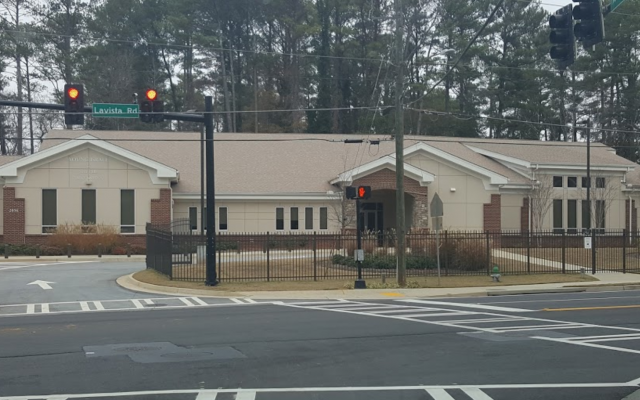Young Israel of Toco Hills Synagogue Changes its Name
The decision by Young Israel of Toco Hills to leave the national Young Israel movement ended months of acrimony punctuated by social media posts and demands for an apology.
Dave Schechter is a veteran journalist whose career includes writing and producing reports from Israel and elsewhere in the Middle East.

The decision by Young Israel of Toco Hills to leave the national Young Israel movement ended months of acrimony punctuated by social media posts and demands for an apology.
The decision was announced June 12 in a letter to the congregation from Rabbi Adam Starr and synagogue president Marc Sokol.
“At this time, we are pleased to assume our shul’s Hebrew name, Kehillat Ohr Hatorah, which reflects our mission of spreading the light and beauty of the Torah to all who wish to learn and grow with us, a mission that has resonated in Atlanta and beyond. After deliberation and through an open and inclusive process, our members have decided to no longer affiliate with the National Council of Young Israel due to our organizations not being a strong fit for one another. We are proud to be a Modern Orthodox kehilla kedosha [“holy community”] and will continue to affiliate with the Orthodox Union, the largest Orthodox synagogue organization in the country. We wish the National Council of Young Israel the best as they continue to serve Klal Yisrael,” the letter read.
A committee within the congregation favored disaffiliation and recommended a vote by the membership. The synagogue board required that at least 67 percent of eligible member units vote and that at least 67 percent of those voting approve of that action. In the end, the participation rate was 80 percent and more than 93 percent of those voting favored disaffiliation.
The synagogue’s leadership informed the president of NCYI on June 11 of the vote and “our desire to move forward in a measured, responsible manner over the next couple of months. They were receptive to our request and share our desire to keep this amicable. Our leadership and the National Council leadership wished each other well and agreed to cooperate on the transition,” Starr and Sokol said jointly in response to questions from the Atlanta Jewish Times.
Starr and Sokol declined to speak about the events that led up to the decision. “We have no interest in talking about the past. Our proudly diverse, inclusive, dynamic and growing Modern Orthodox congregation is now focused on our bright future,” they said.
As of June 13, NCYI had not responded to an AJT request for comment.
Holocaust historian and Emory University professor Deborah Lipstadt, whose resignation from YITH to disassociate herself from the national movement brought national attention to the dispute, told the AJT June 12 that she was “delighted to have already rejoined,” having done so “as soon as I heard results of vote.”
The dispute began Feb. 25, when NCYI president Farley Weiss endorsed Israel Prime Minister Benjamin Netanyahu bringing into his electoral coalition a party formed by followers of the late Rabbi Meir Kahane, whose ultra-nationalist Kach party was banned in Israel for incitement to racism.
In a March 1 letter, 22 Young Israel synagogues asked the NCYI “to immediately cease making all political pronouncements,” suggesting that the issue was long-standing.
Emotional buttons were pushed by a March 4 Twitter post from Yechezkel Moskowitz, then president of NCYI’s advocacy division (but who is no longer on its board): “Everyone of the Rabbis on this list from reconstructionist lover @RabbiStarrYITH to tree hugger Barry Kornblau should be ashamed of themselves joining with liberal progressive groups like @IfNotNowOrg in attacking @NCYIYoungIsrael for defending Israels democracy. #NotMyJudaism”
The “reconstructionist lover” remark referred to a gathering Nov. 2 last year, on the first Shabbat after the massacre at the Tree of Life synagogue in Pittsburgh. Members of YITH and Congregation Bet Haverim met in the street between their synagogues for prayers, psalms and songs led by Starr and Rabbi Joshua Lesser of CBH, a Reconstructionist congregation.
Starr rebuked Moskowitz March 5 on Facebook: “This is not just an ad hominem attack on me (and Rabbi Barry Kornblau for his tree hugging) but by extension it’s an attack on my Shul and community,” as well as the other YI synagogues that signed the letter. Starr also apologized to Lesser.
Kornblau, the rabbi of Young Israel Congregation of Hollis Hills-Windsor Park in Queens, N.Y., posted a photo of himself hugging a tree.
Young Israel of Toco Hills then demanded an apology for Moskowitz’s comments from the leadership of NCYI and created a committee to study the synagogue’s future affiliation with the movement.
In response to YITH leaving the movement, Moskowitz told the AJT, “My personal reaction is that I think it’s good for both parties. I wish the community well in its future endeavors and service of Hashem. But what this makes abundantly clear to me is that the 22 rabbis who signed against NCYI, many did so not because they were upset with the leadership of the NCYI not consulting them, but because of their right-leaning philosophy – which for whatever reason [they] felt hurts the name of the movement. That’s their right, it’s a free country.”
According to its website, NCYI serves 135 synagogues in the United States, Canada, Israel and elsewhere. That number is now 134.



comments